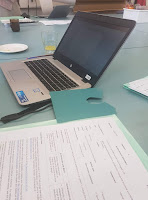Positive
Relationships @ FFC
14th November, 8:35 - 10am
Facilitator
Belinda (former FFC student)
We began by introducing ourselves and sharing three facts - this was enlightening!
Positive change office is in Greenwood St close to highly addictive Takeaways.
Started with Belinda discussing what she does and who she works with - a range of kids and adults who are in a various situations where they need support.
They learn about recognising where in their body's they 'feel' anger. Strategies are given to acknowledge their anger and recognise that they are in unsafe situations - "unsafe for me and unsafe for others".
Physical signs match up with their emotions such as throwing, punching, kicking, fast breathing and swearing (verbal abuse/harassment).
For our students, they need to find out where their safe place is. They need to know that they have a safe place and take some time out to work on the way they are feeling.
How well do we know I students? How do we manage that? Assert the boundaries, but also show love and offer a safe environment. Learn about their backgrounds and the environments where they come from/what they are going through.
Going on this course, students learn that their beliefs are what determine who they are, how they act etc. Their beliefs are what determines how they react in unsafe situations and what they are protective of. If for example, Whaanau is really important they will go to any length to protect their Whaanau.
Learning to understand that their beliefs can change and this is OK. O0ur beliefs may not align with a students or their whaanau. As a group we discussed what is our beliefs are and why they are important.
Communication Styles:
- Passive: Compliant, submissive, talks little, vague non-committal communication, puts self down, praise others.
- Assertive: Actions and expressions fit with words spoken, firm but polite and clear messages, respectful of self and others.
- Aggressive: Sarcastic, harsh, always right, superior, know it all, interrupts, talks over others, critical, put downs, patronising, disrespectful of others
Students identify their traits from each category and decide what percentage of each they are and what they need to work towards.
How to be assertive/submissive/stick to the facts: lowering your body position and sitting by the person.
Use a compliment sandwich: Bread, something they did well - filling is the concern/complaint - Bread - something else.
We were given little bits of paper with scenarios - deadlines not meant/silly behaviour
Agree to disagree is something they need to be taught and discuss that it's ok to have an opinion. Accept that sometimes people won't reason with you - just work on not responding with aggression
How do alcohol and drugs affect our lives/whaanau? The kids were asked these questions and wrote their thoughts on a big piece of paper. Belinda shared the fact that so many kids smoke weed and so many of their home environments are immersed in drugs. Also discussed with the kids, especially the girls, how vulnerable they are when they are intoxicated and how they can look after themselves.
Te whare tapa wha. Both the negative and positive effects are discussed with students. Because this is also taught in our school, the kids clicked on straight away.
Power and control - domestic violence. This session is heavily monitored because of the sensitivity and impact on kids. Identifying that it is learnt behaviour - perpetrators are 80% males, 20% females. Abuse, family violence affects the whole family and also their pets. Discussing with the kids how this is not the norm in every family and how to ensure they are safe.
There is a increased chance of becoming a perpetrator if you are male and the male role model in your life is abusive and also becoming the victim if you are female and a female role model is being abused.
A safe environment is so important to these kids.
Healthy Relationships at FFC
Negotiation and fairness
Non threatening behaviour
Respect
Trust and support
Honesty and accountability
Responsible parenting
Shared responsibility
Economic partnership
We filled in our thoughts on a triangle piece of paper with different titles from the list above of healthy relationships. Interesting thoughts from each group!
Dealing with the spectrum of attitudes and behaviours in our school can be challenging, so this type of PD is AWESOME!!
Healthy teachers and healthy students = a healthy FFC




























